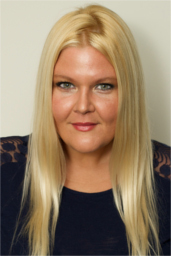
Best published photographic reporting from abroad requiring exceptional courage and enterprise
AWARD YEAR: 2016
AWARD NAME: The Feature Photography Award
AWARD RECIPIENT: Meridith Kohut
AWARD RECIPIENT AFFILIATION: The New York Times
AWARD HONORED WORK: “Inside Venezuela’s Crumbling Mental Hospitals”
Meridith Kohut’s moving images brought attention to the plight of people in Venezuela’s state-run psychiatric hospitals, places that have been all but forgotten in that country’s disintegration. The stark, powerful photographs from inside the halls of those institutions grimly cast a light on endemic suffering and malnourishment.
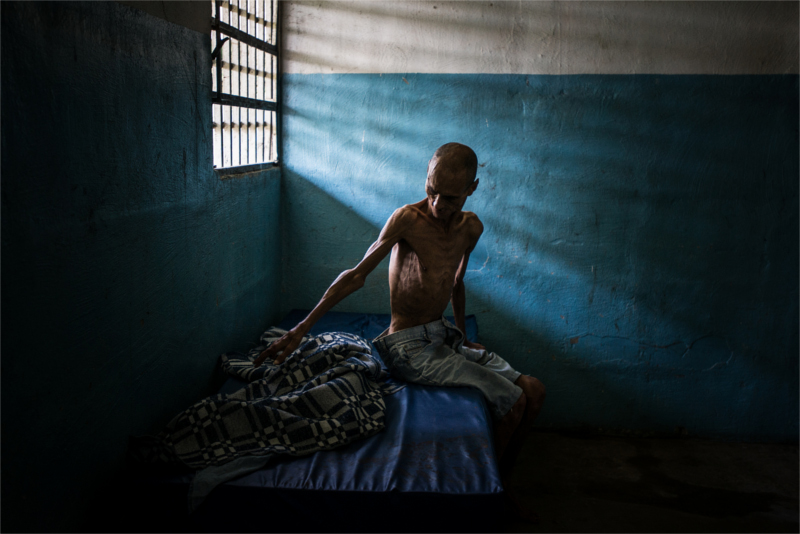
Schizophrenic patient Omar Mendoza at the state-run psychiatric hospital, El Pampero, in Barquisimeto, Venezuela in August 2016. Badly malnourished, Mr. Mendoza weighs only 35 kilos, about 75 pounds, joining over half of the male patients there who are underweight. The economic crisis that has left Venezuela with little hard currency has also severely affected its public health system, crippling hospitals like El Pampero. The hospital has almost no drugs to control the afflictions tormenting its patients, the majority of whom have been abandoned by their families and rely completely on the state to meet their basic needs. Photo: Meridith Kohut

Patients spend time in the courtyard of the women’s ward at the state-run psychiatric hospital, El Pampero, in Barquisimeto, Venezuela in July 2016. Women who are functional while medicated curled on the floor hallucinating, crying, screaming, and rocking back and forth for hours. The doctors and nurses there are aghast at what is taking place, caught between anger and feelings of helplessness. Photo: Meridith Kohut
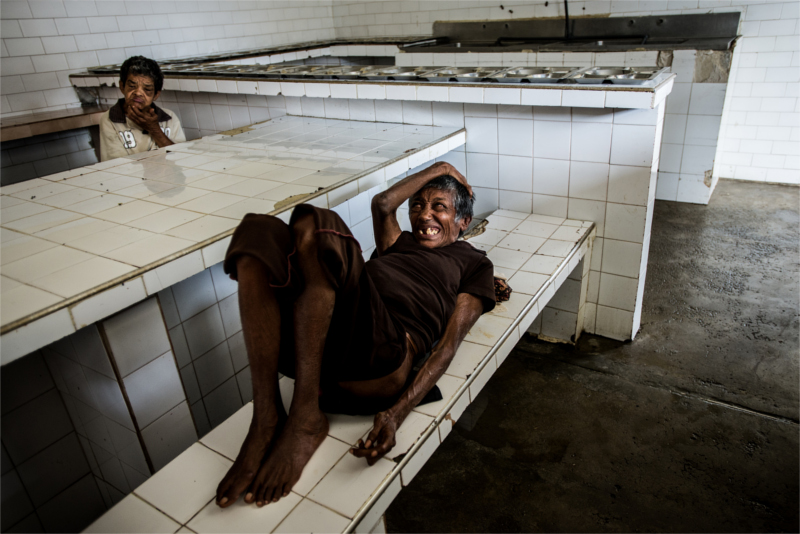
Schizophrenic patient AlegrÌa Flores rests at the dining hall table at the state-run psychiatric hospital, El Pampero, in Barquisimeto, Venezuela in July 2016. Lacking medication for her disorder, Ms. Flores regularly urinates and defecates on herself while her skin has become infected with scabies. Photo: Meridith Kohut
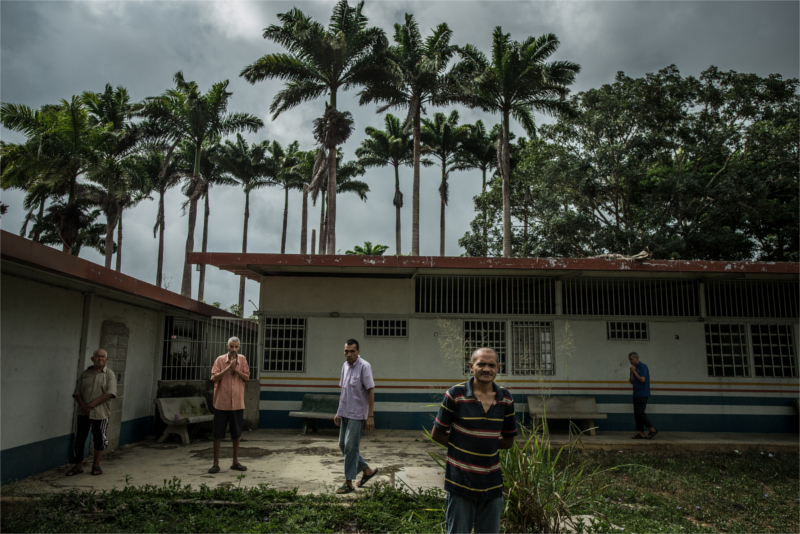
Patients walk around the garden of the men’s ward at the state-run psychiatric hospital, El Pampero, in Barquisimeto, Venezuela in August 2016. Nurses fear that patients in the men’s ward are more likely to become violent when they are unmedicated. Two of the men in this photograph murdered members of their families before their schizophrenia was diagnosed: one decapitated his mother, and the other stabbed his stepfather. Photo: Meridith Kohut

Schizophrenic patient Cleofila Carrillo recovers under a mosquito net at the state-run psychiatric hospital, El Pampero, in Barquisimeto, Venezuela in August 2016, two days after her unmedicated bunkmate had leapt on top of her, beaten her, bitten off her nose and eaten it. Doctors said Ms. Carrillo needed full reconstructive surgery, but because of shortages, they did not have the medical supplies to perform it. All they could do was apply a bandage. Photo: Meridith Kohut
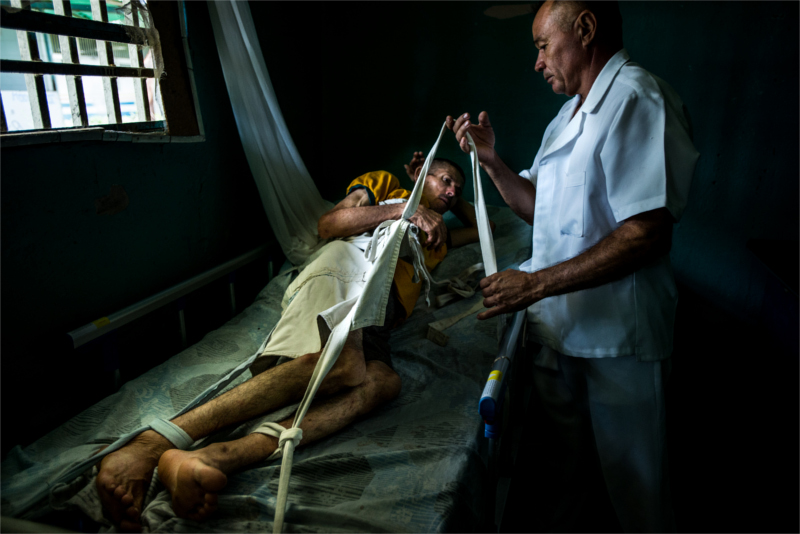
A nurse ties Raul Martínez, a paranoid schizophrenic patient who was suffering a psychotic episode, to a gurney at the state-run psychiatric hospital, El Pampero, in Barquisimeto, Venezuela in July 2016. Without sedatives, nurses say, they must restrain patients or lock them in isolation cells to keep them from harming themselves. Photo: Meridith Kohut

Margarita Silva, a paranoid schizophrenic patient, yells at nurses from her solitary confinement cell at the state-run psychiatric hospital, El Pampero, in Barquisimeto, Venezuela in August 2016. Ms. Silva had been confined after attacking a fellow patient by beating her, biting off her nose and eating it. The nursing staff said it was unlikely Ms. Silva would have done so if she had been medicated, or under the regular care of a psychiatrist. Photo: Meridith Kohut
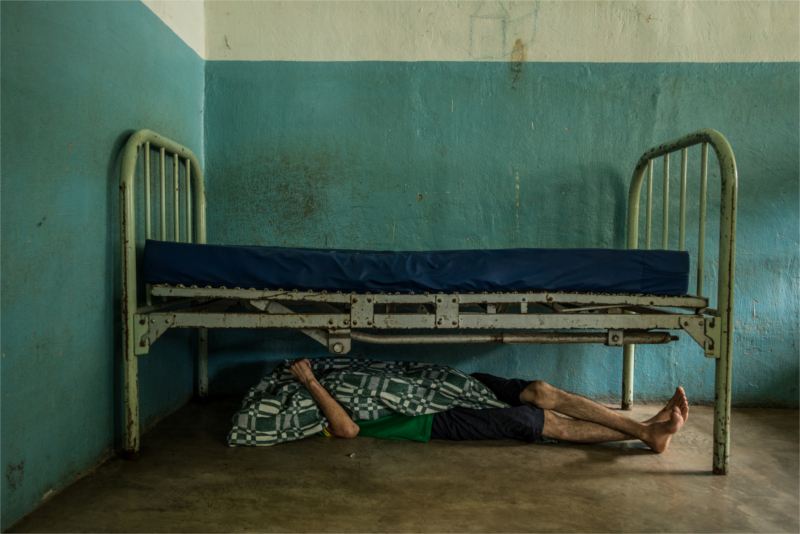
Raul Martínez, a paranoid schizophrenic patient who also suffers from depression, takes a nap under his bed at the state-run psychiatric hospital, El Pampero, in Barquisimeto, Venezuela in July 2016. Mr. Martínez is one of many patients who lack the medications they need to remain stable. Photo: Meridith Kohut

Josefina Zapata, a patient suffering from psychosis and epilepsy, in solitary confinement at the state-run psychiatric hospital, El Pampero, in Barquisimeto, Venezuela in August 2016. Ms. Zapata was not violent, but the hospital staff did not have the anticonvulsants she needed. The staff regularly kept her locked in this cell, on a mattress on the floor, so that when she started convulsing, she was less likely to hurt herself. Photo: Meridith Kohut
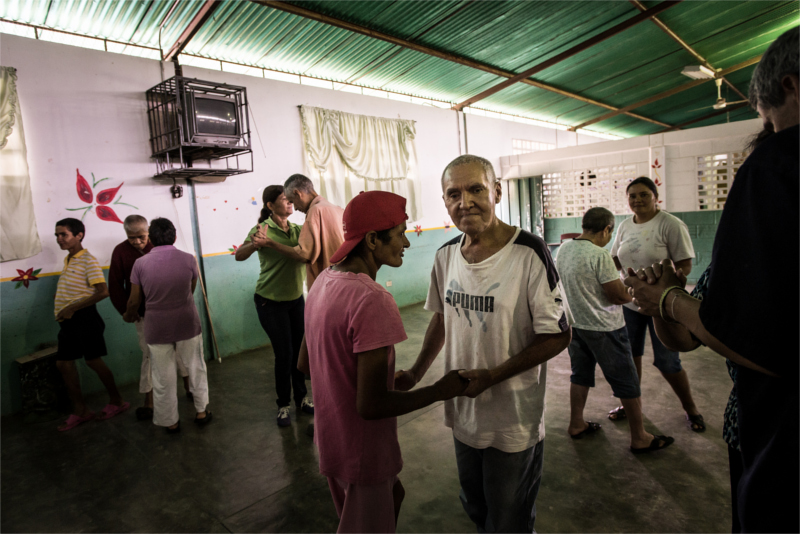
Following a weekly routine, therapists at the state-run psychiatric hospital, El Pampero, in Barquisimeto, Venezuela put on salsa music and hold a dance for the 10 percent of patients who are stable enough to participate in July 2016. Before the medicine shortages, the recreation center held weekly sewing, cooking and sculpture classes, even a farming program. One therapist said: “When patients have their medicines, they can do really complex crafts. Now they just do simple tasks.” Photo: Meridith Kohut
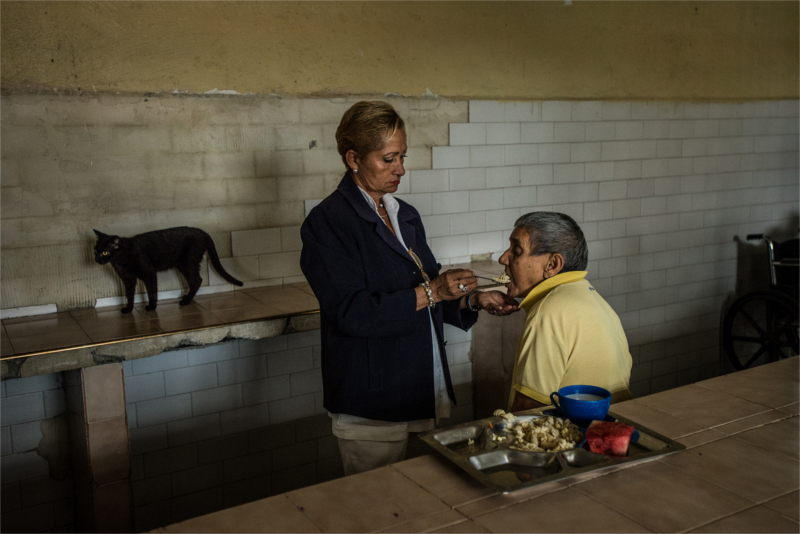
Evila García, the head nurse at the state-run psychiatric hospital, El Pampero, feeds a blind patient as a stray cat roams around the women’s ward dining hall in Barquisimeto, Venezuela in July 2016. Several stray dogs and cats live in the hospital, and the dogs often sleep with patients in their beds. Nurses worry about parasites because the animals have not had their shots and have not been dewormed, but some patients find comfort in them. Photo: Meridith Kohut
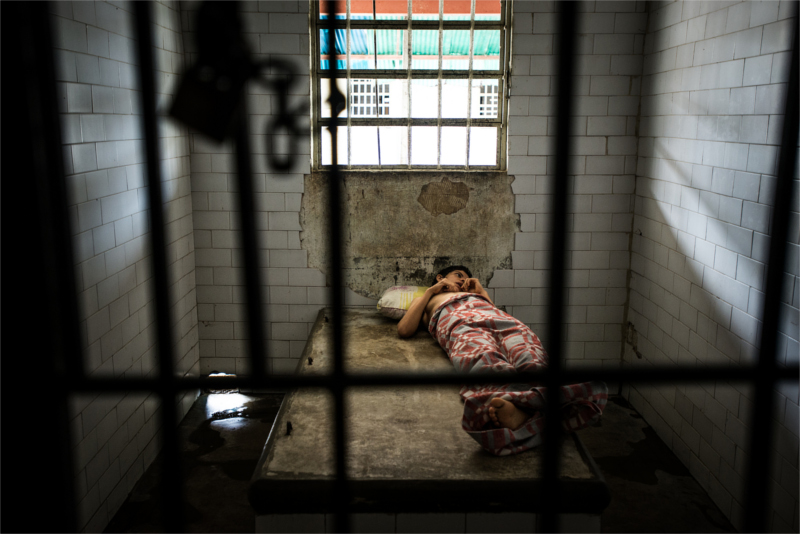
Evila García, the head nurse at the state-run psychiatric hospital, El Pampero, feeds a blind patient as a stray cat roams around the women’s ward dining hall in Barquisimeto, Venezuela in July 2016. Several stray dogs and cats live in the hospital, and the dogs often sleep with patients in their beds. Nurses worry about parasites because the animals have not had their shots and have not been dewormed, but some patients find comfort in them. Photo: Meridith Kohut
Citation Recipient: Tomas Munita
Affiliation: The New York Times
Honored Work: “Cuba on the Edge of Change”
Citation Page >>
